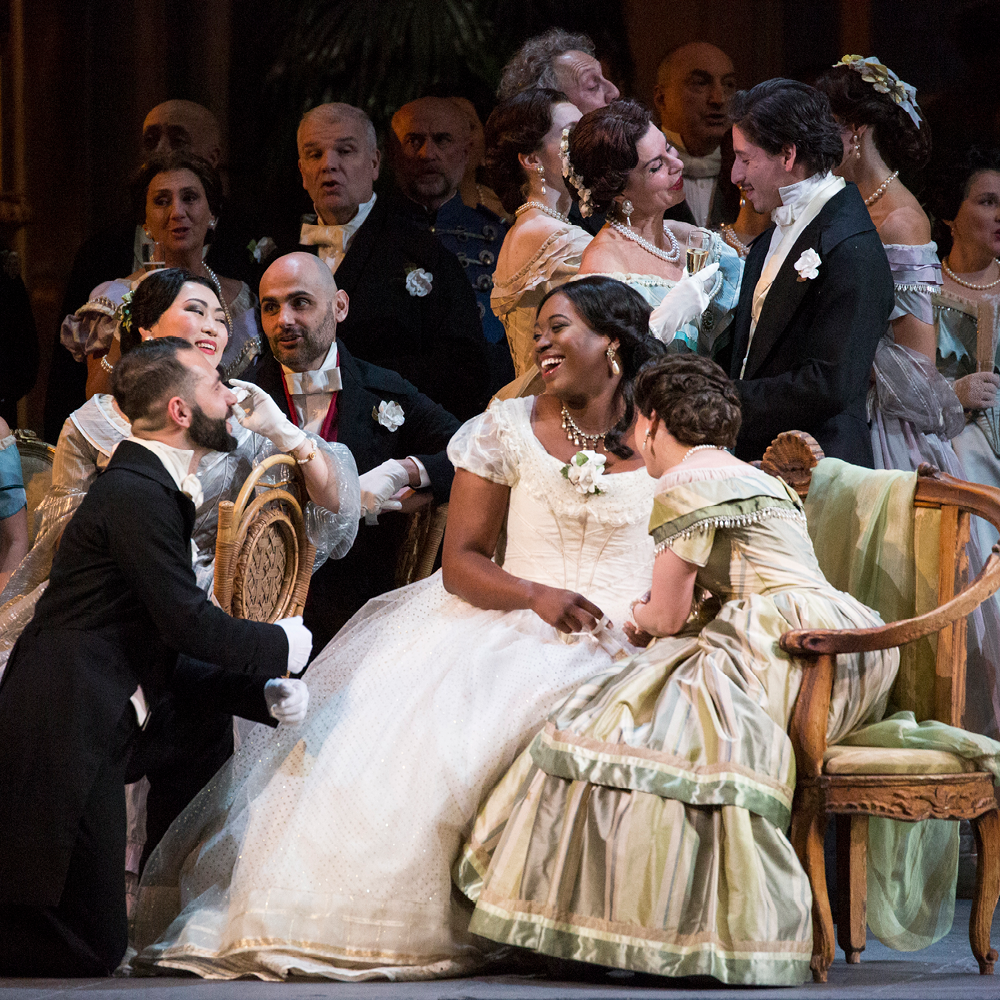Flying into the Future
Click here to read Part 2 / Part 3 / and Part 4 of GAME-CHANGING MOMENTS IN OPERA.
Opera was changed forever on March 12, 2019, the moment soprano Angel Blue walked onto the stage at Teatro alla Scala in Milan to perform as Violetta in Giuseppe Verdi’s La traviata.
She had performed at the theater before, as Clara in Porgy and Bess and Musetta in La bohème. But Angel had always dreamed of taking the stage at La Scala—the storied theater that opened its doors in 1778, where Verdi himself once roamed, and where he premiered six of his operas—as the composer’s tragic heroine Violetta.
She was already an international sensation when she got the call: a last-minute request to fill in as Violetta for another soprano, which she accepted without hesitation. And so, Angel Blue became the first Black artist to sing the fully staged role, not only at La Scala, but in all of Italy.
“I had a lot of people telling me, you know, this is the first time a Black soprano has sung Traviata in the country,” she remembers. “And I thought, no, that can’t possibly be. Traviata was written in 1853. That’s a long time. That’s like—1853 to 2019 is like 166 years or something, you know?” But it was true.
During our chat over Zoom, Angel tears up, remembering the way the Italians welcomed her and cared for her—the hotelier who worried about how much sleep she got, the restaurateur who triple-checked she had enough to eat, the people on the street who voiced their support. “I felt like a superstar,” she says.
The experience stood in stark contrast to another day, almost two decades ago, when a teacher told Angel that there would never be a Black Violetta. Thank goodness, she didn’t listen. “I never heard from my parents, you can’t do something. I never heard, because you’re Black, you don’t do this or you don’t do that,” she tells me. “And when I heard the person say that, I just thought to myself—honestly, I thought in my heart, well, that means I have to be the first.”
A few years later she proved her teacher wrong, performing her celebrated Violetta for the first time in Seoul. Today she has sung the role not only at La Scala, but twice at London’s Royal Opera House and around the world. It has become her signature.

What draws her to this character? “It’s a tour de force. If you can sing that, then you can sing anything,” she says. “I’m very much obsessed with Violetta as a person. She really does give up something—her own happiness—just for someone else.”
She feels an emotional connection to Violetta. “I suppose the way I become her is that I really am encouraging myself throughout the whole night—remember when they told you that you shouldn’t be singing this? Remember when you heard that you can’t do this? Remember when you heard that Black sopranos crash and fail at this? All of those things, I think, help me to find the grit that Violetta has.”
There’s a funny thing about people who change the game: they do it again and again. Just this summer, Angel had been set to return to Italy to make her debut as Violetta at the Arena di Verona. But a few weeks beforehand, something changed her mind. The theater used blackface makeup in its production of Aida. She could not be silent.
“The use of blackface under any circumstances, artistic or otherwise, is a deeply misguided practice based on archaic theatrical traditions which have no place in modern society. It is offensive, humiliating, and outright racist. Full stop,” Angel wrote in a headline-making public statement. “I was so looking forward to making my house debut at Arena di Verona singing one of my favorite operas, but I cannot in good conscience associate myself with an institution which continues this practice.”
Angel Blue is a soprano at the peak of her powers; the most sought-after Violetta in the world; an artist who can choose where to perform, and where not to. It is the industry that must seek her approval, not the other way around. All of which makes this moment—Angel opening HGO’s season, in her company debut as Violetta—even more special for everyone in this city.
We could not be more honored to have Angel, and all that she represents, here in Houston, and to share in her historic changing of the operatic game. In turn, she is building upon this company’s legacy of game-changing, and our mandate to make opera relevant to all audiences. We know we will get there together.
What does Angel hope for opera’s future? “This is going to sound so weird,” she says, “but I want us to be like we were in 2020.” She thinks back to the pandemic’s most devastating days. The warmth and connection between all of us in the industry, how much we adore this art form, how determined we are to protect it—she wants these truths to be as plainly visible now as they were then.
“We weren’t going to stop,” says Angel. “We were going to keep the art form alive. We were very connected as artists, as an art form, and we cared about each other. In the future, I hope that that love for not just singing and performing, but our love for each other continues. If we maintain that, then we’re going to be good.”
From your lips to God’s ears, Angel. Welcome to Houston!